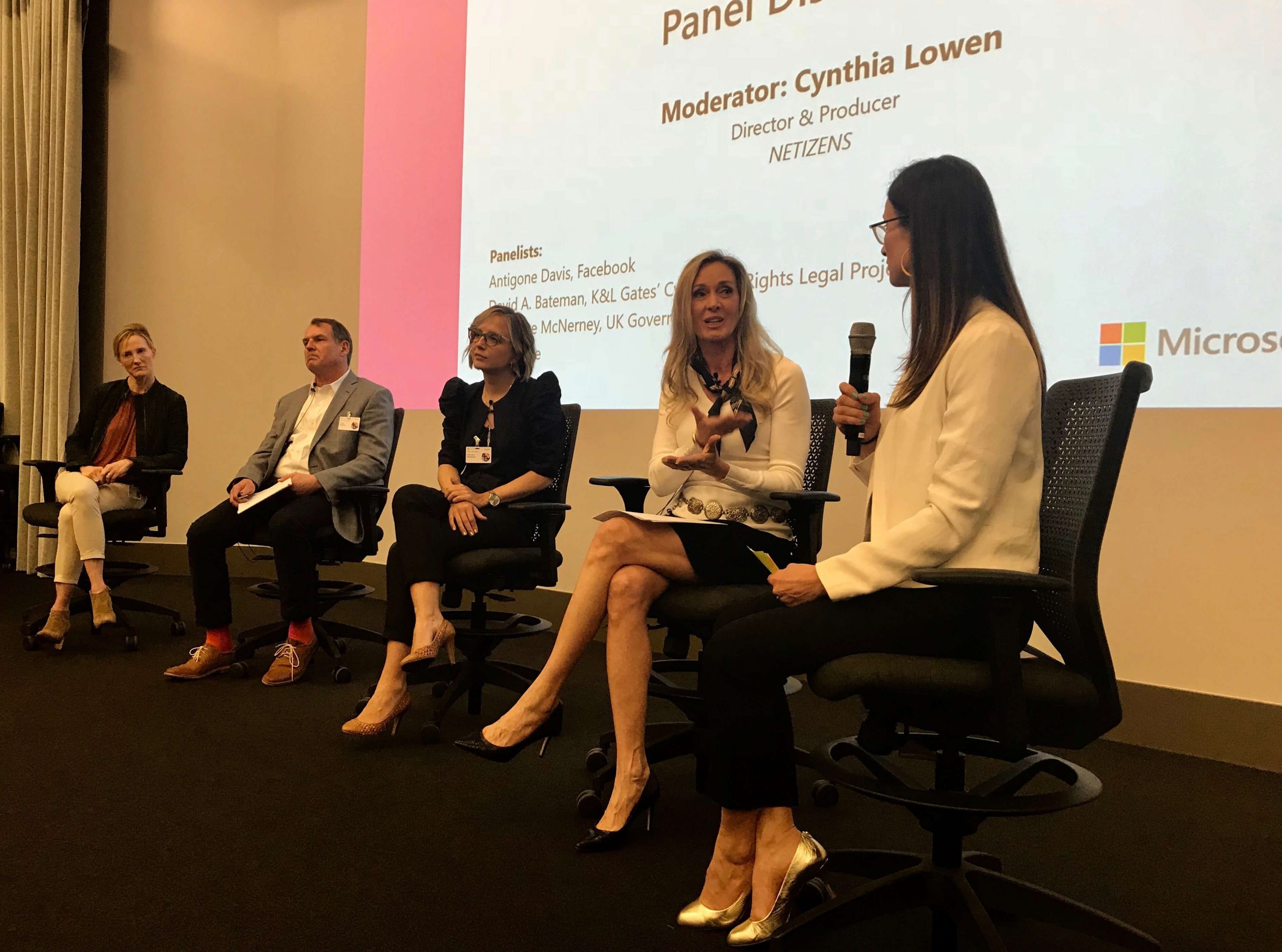Microsoft recently hosted a screening of the documentary film “Netizens”, which examines the online harassment of women and the non-consensual distribution of intimate images, what is commonly but unartfully referred to as “revenge porn.” The event, which included a multi-stakeholder panel discussion, underscores the need for all groups to work together to tackle online hate and abuse and to promote digital civility and safer and more respectful online interactions.
Held last Wednesday on Microsoft’s Redmond, Washington, campus, the panel was moderated by the film’s director and producer, Cynthia Lowen. Panelists were Antigone Davis, director and global head of safety at Facebook; David Bateman, a partner and co-founder of K&L Gates’ Cyber Civil Rights Legal project; Mary-Eve McNerney, head of tech policy for the U.K. government at the British consulate in San Francisco and Tina Reine, one of three central women featured in the film.
“We’re at a turning point in recognizing how deeply our communities are impacted by digital abuse, and how high the stakes are in facing online harassment head-on,” Lowen said in opening remarks. “Microsoft’s digital civility work is leading a global effort in building coalitions, creating empathy and promoting positive online behaviors. We need leadership that is courageous, collaborative and creative, and my hope is that today is about action, and finding areas where we can work together, and bring our unique expertise, perspectives and experiences to bear.”
Lowen said online harassment presents significant challenges, but at the same time offers genuine opportunity to reimagine what our online and offline communities could “look, feel and be like.” In addressing issues like online harassment, abuse and exploitation, “we also have an opportunity to reshape the world around us,” she said.
The film highlights the ongoing challenges of basic knowledge, awareness and appreciation of the issues among certain groups. Panelists pointed out the need to educate some stakeholders, including local law enforcement and, from time to time, victims themselves. “When victims want to get help, they don’t even know where to turn,” said Bateman from K&L Gates, adding that victims’ primary aim in virtually all cases is to “get the material offline.”
They agreed the current long and costly process of “unmasking” an alleged online perpetrator needs to be quickened and reformed, and they focused on creating and deploying systemic, holistic approaches to these issues.
Microsoft’s approach
At Microsoft, we believe “whole society” strategies hold the greatest promise for addressing issues like online harassment and the non-consensual distribution of intimate images. It was nearly four years ago that we announced our approach to the non-consensual distribution of intimate images on our consumer services. At the time, we sought to put victims back in control of their privacy, stating that when contacted by a victim or his or her representative, Microsoft would remove links to photos and videos from Bing search results and remove the content itself when it was shared on OneDrive or Xbox Live. We created a dedicated web form for making such reports to us.
A year later, we took stock of that approach and made an additional resource available to help victims find so-called “source URLs” of this imagery. Thankfully, Microsoft doesn’t have a large amount of this content on our services, but we feel we have a responsibility to help raise awareness of the issues, to collaborate with others, and to protect our customers, the integrity of our services and the overall online ecosystem. That’s why we wanted to host a screening of this important film.
Digital civility and ‘Netizens’
In addition, Microsoft was eager to collaborate with Lowen and her team given the close alignment to our own ongoing campaign for digital civility, fostering safer, healthier and more respectful online interactions among all people. Our work in digital civility started in 2016, and we’re about to field our fourth installment of global perception and attitudinal research. Each year, we survey teens and adults about their exposure to more than 20 online risks, including “sexploitation” and the non-consensual distribution of intimate images.
The latest data show 3 percent of all respondents said they’d been victims of sexploitation and “revenge porn,” while 25 percent and 16 percent reported experiencing unwanted sexting and unwanted sexual attention, respectively. Meanwhile, 15 percent were harassed online, with unwanted contact in general being more common among women and teens. This most recent study polled more than 11,000 respondents in 22 countries.
Using this data, we strive to raise awareness of online risks and encourage online interactions that are rooted in respect, inclusivity and kindness. Our goal all along in creating a campaign for digital civility was to create a “human platform” upon which others – technology companies, businesses, civil society groups, governments and others – could create their own projects, programs and initiatives founded on this common-sense principle. (Learn more at www.microsoft.com/digitalcivility).
Learn more
In addressing issues like harassment and abusive or harmful content online, we can’t underestimate the power of reporting and relaying: to the technology platform or service, to trusted friends and family members and to local authorities. Use Microsoft’s range of reporting tools to report illegal, abusive or potentially harmful content or conduct.
To learn more about the film, visit the “Netizens” website and consult these Microsoft resources: online bullying and harassment factsheet, risks of sexting factsheet. For more on general online safety issues, visit our website and resources page. And, for regular news and information about online safety, connect with us on Facebook and Twitter.
At the time of writing of this post, Jacqueline Beauchere’s title was Chief Online Safety Officer.

